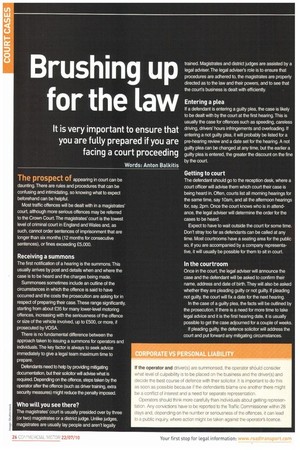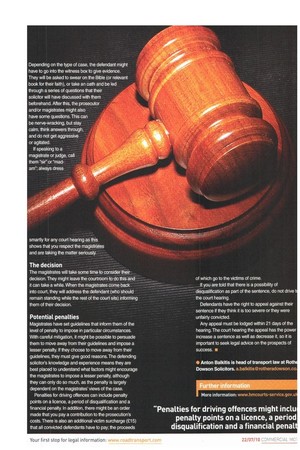Brushing up for the law
Page 26

Page 27

If you've noticed an error in this article please click here to report it so we can fix it.
It is very important to ensure that you are fully prepared if you are facing a court proceeding
Words: Anton Balkitis The prospect of appearing in court can be daunting. There are rules and procedures that can be confusing and intimidating, so knowing what to expect beforehand can be helpful.
Most traffic offences will be dealt with in a magistrates' court, although more serious offences may be referred to the Crown Court. The magistrates' court is the lowest level of criminal court in England and Wales and, as such, cannot order sentences of imprisonment that are longer than six months (12 months for consecutive sentences), or fines exceeding £5,000.
Receiving a summons
The first notification of a hearing is the summons. This usually arrives by post and details when and where the case is to be heard and the charges being made Summonses sometimes include an outline of the circumstances in which the offence is said to have occurred and the costs the prosecution are asking for in respect of preparing their case These range significantly, starting from about £35 for many lower-level motoring offences, increasing with the seriousness of the offence or size of the vehicle involved, up to £500, or more, if prosecuted by VOSA.
There is no fundamental difference between the approach taken to issuing a summons for operators and individuals. The key factor is always to seek advice immediately to give a legal team maximum time to prepare.
Defendants need to help by providing mitigating documentation, but their solicitor will advise what is required Depending on the offence, steps taken by the operator after the offence (such as driver training, extra security measures) might reduce the penalty imposed.
Who will you see there?
The magistrates court is usually presided over by three (or two) magistrates or a district judge. Unlike judges. magistrates are usually lay people and aren't legally trained. Magistrates and district judges are assisted by a legal adviser. The legal adviser's role is to ensure that procedures are adhered to, the magistrates are properly directed as to the law and their powers, and to see that the court's business is dealt with efficiently.
Entering a plea
If a defendant is entering a guilty plea the case is likely to be dealt with by the court at the first hearing. This is usually the case for offences such as speeding, careless driving, drivers' hours infringements and overloading If entering a not guilty plea, it will probably be listed for a pre-hearing review and a date set for the hearing. A not guilty plea can be changed at any time, but the earlier a guilty plea is entered, the greater the discount on the fine by the court
Getting to court
The defendant should go to the reception desk. where a court officer will advise them which court their case is being heard in Often courts list all morning hearings for the same time, say 10am, and all the afternoon hearings for say, 2pm. Once the court knows who is in attendance, the legal adviser will determine the order for the cases to be heard.
Expect to have to wail outside the court for some time. Don't stray too far as defendants can be called at any time. Most courtrooms have a seating area for the public so, if you are accompanied by a company representative, it will usually be possible for them to sit in court.
In the courtroom
Once in the court, the legal adviser will announce the case and the defendant will be asked to confirm their name, address and date of birth. They will also be asked whether they are pleading guilty or not guilty. If pleading not guilty, the court will fix a date for the next hearing In the case of a guilty plea the facts will be outlined by the prosecution. If there is a need for more time to take legal advice and it is the first hearing date, it is usually possible to get the case adjourned for a couple of weeks.
If pleading guilty, the defence solicitor will address the court and put forward any mitigating circumstances Depending on the type of case, the defendant might have to go into the witness box to give evidence.
They will be asked to swear on the Bible (or relevant book for their faith), or take an oath and be led through a series of questions that their solicitor will have discussed with them beforehand. After this, the prosecutor and/or magistrates might also have some questions. This can be nerve-wracking. but stay calm, think answers through, and do not get aggressive or agitated If speaking to a magistrate or Judge. call
Them "sir or -mad
am"; always dress smartly for any court hearing as this shows that you respect the magistrates and are taking the matter seriously.
The decision
The magistrates will take some time to consider their decision. They might leave the courtroom to do this and it can take a while. When the magistrates come back into court, they will address the defendant (who should remain standing while the rest of the court sits) informing them of their decision.
Potential penalties
Magistrates have set guidelines that inform them of the level of penalty to impose in particular circumstances With careful mitigation, it might be possible to persuade them to move away from their guidelines and impose a lesser penalty. If they choose to move away from their guidelines, they must give good reasons. The defending solicitor's knowledge and experience means they are best placed to understand what factors might encourage the magistrates to impose a lesser penalty, although they can only do so much, as the penalty is largely dependent on the magistrates' views of the case.
Penalties for driving offences can include penalty points on a licence, a period of disqualification and a financial penalty. In addition, there might be an order made that you pay a contribution to the prosecution's costs. There is also an additional victim surcharge (E15) that all convicted defendants have to pay; the proceeds of which go to the victims of crime.
If you are told that there is a possibility of disqualification as part of the sentence, do not dove t the court hearing Defendants have the right to appeal against their sentence if they think it is too severe or they were unfairly convicted.
Any appeal must be lodged within 21 days of the hearing. The court hearing the appeal has the power increase a sentence as well as decrease it, so it is important to seek legal advice on the prospects of success. r
























































































































